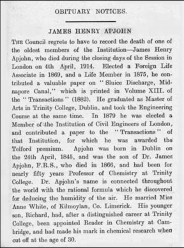- APJOHN
- IRELAND (see also List of Individuals)\
 24.4.1845 Dublin/IE - 4.4.1914 Hammersmith/UK\James Henry Apjohn graduated from the Trinity College, Belfast, as a Master of Arts and took the engineering course at the same time. He was in 1868 appointed to the Indian Public Works Department and served there in the irrigation branch until 1901, when settling in London. He had been a chief engineer in 1898 and was for some years engineer to the Calcutta port commissioners. His name in India is remembered in connection with the Kidderpore docks. He was known in the Calcutta Society. After his retirement Apjohn established an office in London to devote himself to mechanical research. He was elected a Member of the British Institution of Civil Engineers ICE in 1879, after having been elected an associate in 1869, and a Member in 1875 of the Irish Institution of Civil Engineers. Apjohn was awarded the Telford Premium from the ICE for a paper published in its Transactions.\Apjohn's name is known for the rational formula which he discovered for deducing the humidity of air. In hydraulics he is known for his work relative to the navigation canals in India. There, he conducted observations on gate flow and determined experimentally the discharge coefficients for a range of flow conditions. These apply to gates as were then designed throughout the British Empire, of which the barrages on the Nile River in Egypt may be counted among the largest until around 1900. Apjohn also presented a book on the navigation canals in India, with particular reference to the Midnapore Canal in West Bengal, close to Calcutta, in which design he was involved during his long stay on the sub-continent.\Anonymous (1914). James Henry Apjohn. Journal of the Institution of Civil Engineers, Ireland 40: 203-204.Anonymous (1914). James Henry Apjohn. Minutes Proc. Institution Civil Engineers 197: 329. Apjohn, J.H. (1869). Report on the chemical constitution of the well waters in Trinity College, and its vicinity. Dublin.Apjohn, J.H. (1881). Note on experiments made to determine the true coefficient of the discharge of the head sluice of the Midnapore Canal. Trans. Institution Civil Engineers Ireland 13: 249-262.Apjohn, J.H. (1895). Movement of the walls of the Kidderpur docks. Minutes ICE 121: 104-113. Apjohn, J.H. (1895). Navigation canals in India. Bengal Secretariat Press: Calcutta.
24.4.1845 Dublin/IE - 4.4.1914 Hammersmith/UK\James Henry Apjohn graduated from the Trinity College, Belfast, as a Master of Arts and took the engineering course at the same time. He was in 1868 appointed to the Indian Public Works Department and served there in the irrigation branch until 1901, when settling in London. He had been a chief engineer in 1898 and was for some years engineer to the Calcutta port commissioners. His name in India is remembered in connection with the Kidderpore docks. He was known in the Calcutta Society. After his retirement Apjohn established an office in London to devote himself to mechanical research. He was elected a Member of the British Institution of Civil Engineers ICE in 1879, after having been elected an associate in 1869, and a Member in 1875 of the Irish Institution of Civil Engineers. Apjohn was awarded the Telford Premium from the ICE for a paper published in its Transactions.\Apjohn's name is known for the rational formula which he discovered for deducing the humidity of air. In hydraulics he is known for his work relative to the navigation canals in India. There, he conducted observations on gate flow and determined experimentally the discharge coefficients for a range of flow conditions. These apply to gates as were then designed throughout the British Empire, of which the barrages on the Nile River in Egypt may be counted among the largest until around 1900. Apjohn also presented a book on the navigation canals in India, with particular reference to the Midnapore Canal in West Bengal, close to Calcutta, in which design he was involved during his long stay on the sub-continent.\Anonymous (1914). James Henry Apjohn. Journal of the Institution of Civil Engineers, Ireland 40: 203-204.Anonymous (1914). James Henry Apjohn. Minutes Proc. Institution Civil Engineers 197: 329. Apjohn, J.H. (1869). Report on the chemical constitution of the well waters in Trinity College, and its vicinity. Dublin.Apjohn, J.H. (1881). Note on experiments made to determine the true coefficient of the discharge of the head sluice of the Midnapore Canal. Trans. Institution Civil Engineers Ireland 13: 249-262.Apjohn, J.H. (1895). Movement of the walls of the Kidderpur docks. Minutes ICE 121: 104-113. Apjohn, J.H. (1895). Navigation canals in India. Bengal Secretariat Press: Calcutta.
Hydraulicians in Europe 1800-2000 . 2013.
